During Irene’s Italian stay, she paid a visit to a local institution and a much beloved childhood memory, the Michelin-star restaurant La Palta located in Bilegno, Piacenza, in the region of Emilia Romagna.
La Palta is run by two sisters, Isa and Monica Mazzocchi, queens of the kitchen and of the dining room respectively. Running the restaurant with them is Isa’s husband, Roberto, master of the wine list and poet, and a staff populated with their children and family members, always laying out a helping hand in what is a space of conviviality as much as their own home.
Isa’s and Monica’s parents gave birth to the original Palta as an osteria, and then built the current restaurant in 1989, which was awarded a Michelin star in 2012. As common practice in villages, restaurants, shops, and bars are a central part in the life of the families who run them, as the home and the family business often inhabit the same place.
It’s 9.30am on a Friday morning in July, Italy has re-opened its regions after lockdown on June 4th, and restaurants have re-opened their doors to diners, after re-inventing the way they host.
It’s specifically one of La Palta’s take-away menus, created by Isa for Monica during lockdown, that awoke our salmon pink hearts and made us want to celebrate this sisterhood in the kitchen.
Quoting Isa: “In this tale, I want to return to the initial chapter, to my roots and to my family, who in this period have supported my ‘tree’ in such an important way. In particular, I return to my sister Monica, my partner in adventures and discussions since forever. What keeps us together is above all the sharing: from the morning espresso when we open the restaurant, to the new dishes she tastes directly in the kitchen, and on to the gaze on ‘her dining room’ ”
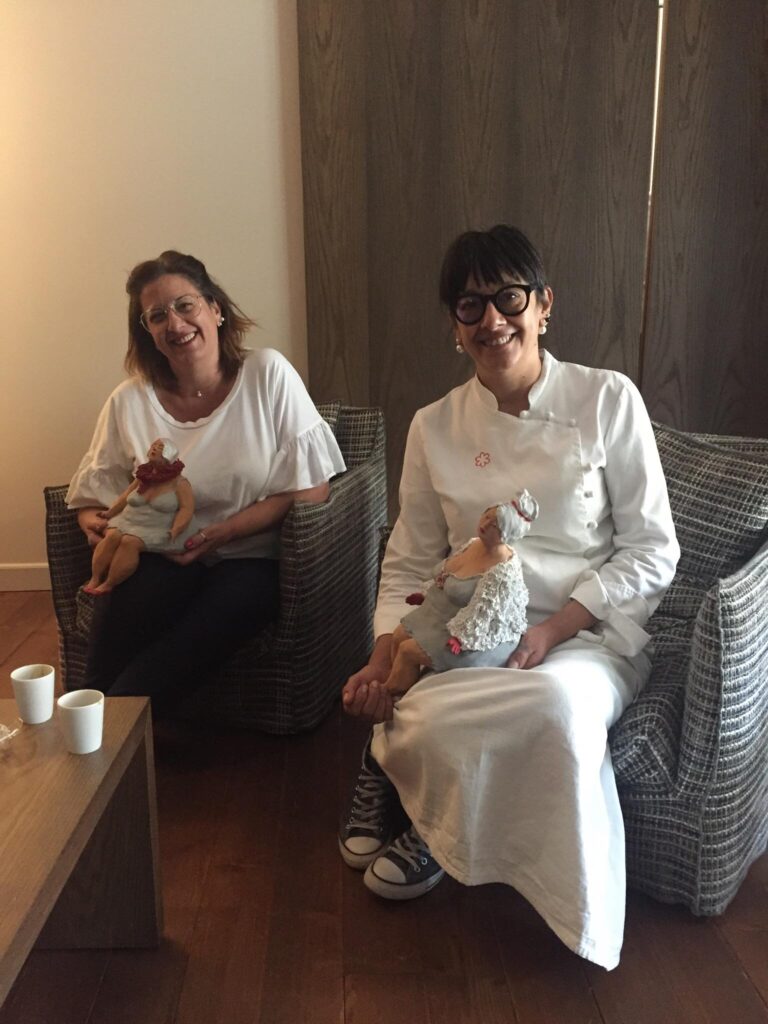
It’s in front of that morning espresso, as pots already simmer in the kitchen, Roberto takes the kids to their summer activities and their mother Stefana comes down for breakfast, that we chat to Isa and Monica about food and memory, motherhood and sisterhood, and the love for the land.
Note: italics our own
Salmon Pink Kitchen: Can you please tell us about your childhood memories of La Palta and how the restaurant was born?
Isa: Well, La Palta was born as the town’s osteria, the meaning of ‘palta’ in Piacenza’s dialect is ‘l’appalto dei sali e dei tabacchi’, one of those places which, annexed to the osteria, sold everything from needles for threading, to washing up liquid, to charcuteries and bread, to pasta and loose beans.
Monica: They even sold medicines!
Isa: The shop had all that was necessary for the functioning of a town. From there, in 1989, our parents built what is the current restaurant La Palta, and we then looked to turn this little town (Bilegno has a population of 92) into a gastronomic destination for people who came from other areas. We were well known in our province, but creating this type of restaurant also meant being known outside of Piacenza.
Monica: When we were little, they made us cut the anolini (typical ravioli served with a broth) and we got blisters all over our hands after using that pasta cutter. We had to put each raviolo in place, one by one. Our house basically didn’t exist, because we walked in the osteria was already there.
So, when you came down in the morning it wasn’t like today’s world at all, with parents asking you what you wanted for breakfast. There were already people drinking bowls of red wine (this is a tradition in Piacenza, to drink red wine from the scudlein) Or they’d be drinking a morning grappa made of prunes. This made us grow quite tough because we lived with these types of characters coming and going around the house. You know, today one is much more careful with their children, but back then!
You woke up to the smell of food, of roast and sauce. You went to sleep with people still partying downstairs who wouldn’t leave until 2am, and you would listen in. It was beautiful. Each night, I went to bed with a small piece of paper because, to go upstairs, I could get through the shop via a small door. So I would cut myself a few slices of coppa to eat in bed with crackers. I’d have to be very quiet as we used to share the room with uncle Dante, the owner of the old Palta, and if he heard us talk he’d get very angry. I would place the piece of paper under my chin and eat the coppa in peace. Coppa is what made me grow up.
Salmon Pink Kitchen: What were your favourite dishes as children?
Monica: Coppa, gnocchi and zabaione (zabaione is a sweet cream made of eggs, sugar and wine).
Isa: Surely coppa for me too, it’s something I depend on – if I go a couple of days without eating it I can feel it. Whereas, as a favourite dish, my memories of dishes are linked to certain preparations: nonna Alice’s aubergine parmigiana, zia Maria’s pisarei e faśö, zia Assunta’s frittata, each dish reminds me of a person.
They’re sentimental memories, not memories of taste, and they’re memories of moments and an atmosphere, it’s not about the dish.
So, my favourites will always be these dishes, even the simplest, but that always return to the people who made them, to that affection.
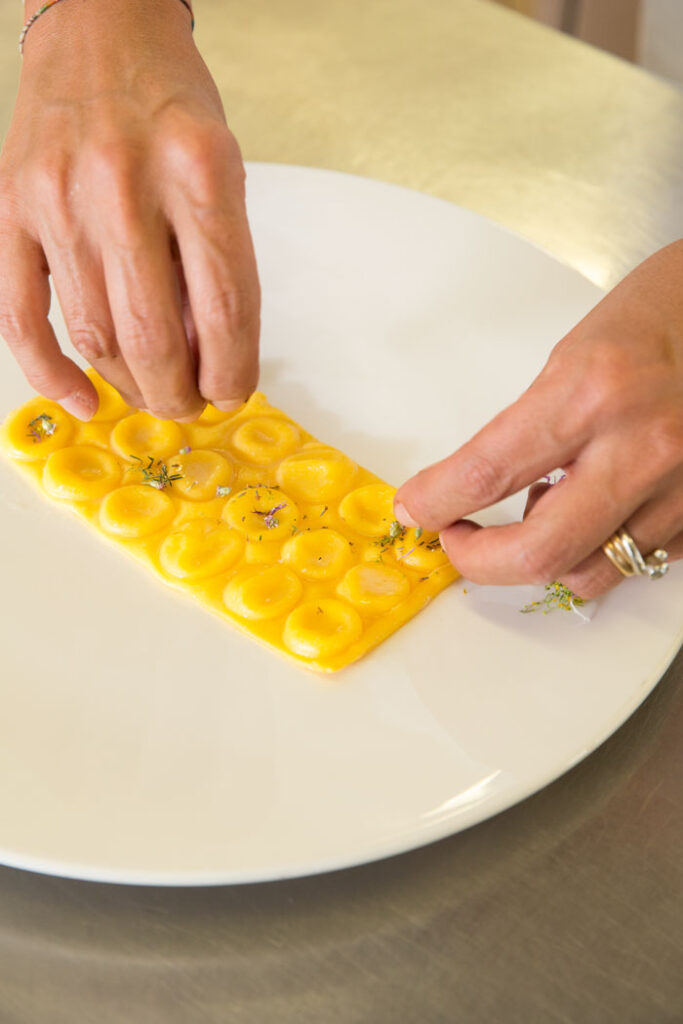
Salmon Pink Kitchen: And speaking of nonne and zie, is there a dish from your mamma Stefana that you remember fondly?
Isa: There are so many! But, if I have to pick one, it’s her whisky guinea fowl, seasoned with herbs, then dunk in whisky and cooked until the alcohol evaporates. It’s the attention to detail with which she prepared it, everything she did she always did it with that care. Nothing was ever left to chance, only to the time each dish required.
Monica: And then her sauces, her stews, the stracotto d’asina, the pìcula ad caval.
Isa: And then her pizzas…
Monica: Ah yes, her pizzas. (Monica and Isa sigh at the thought of them)
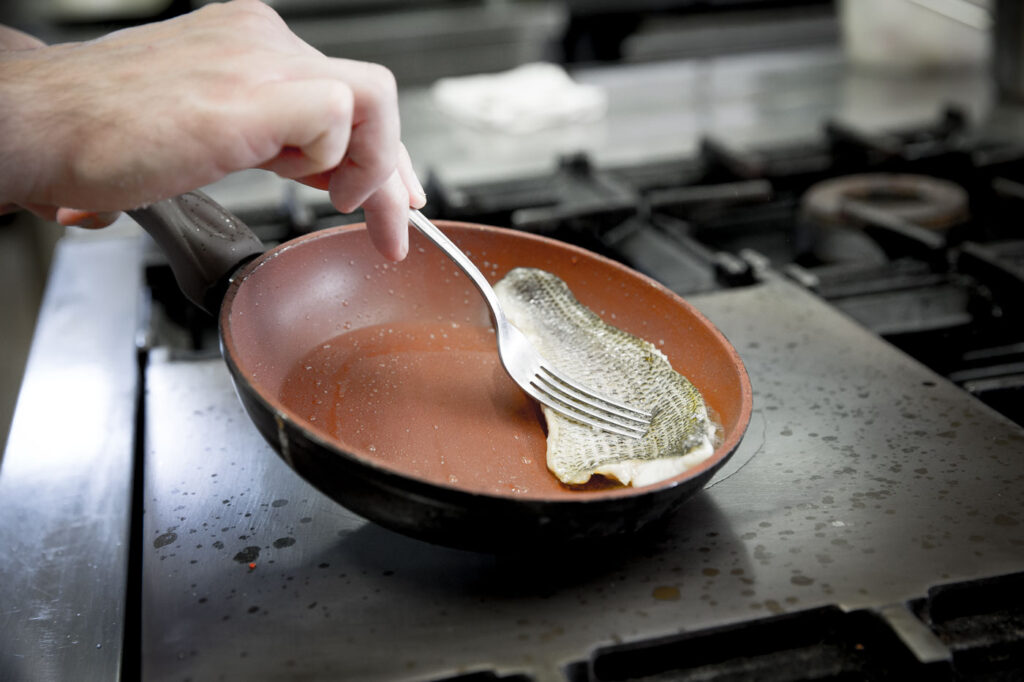
Salmon Pink Kitchen: What’s your favourite ingredient from this territory?
Isa: For me it’s the tomato.
Monica: You stole my answer!
Isa: Because you find it for the whole of summer and you preserve it in winter, so it’s something you have 365 days a year. You can do anything with it, and thanks to this micro-climate we have here it becomes something truly special, it’s such a crucial produce for our territory.
Monica: You even used it in a dessert, with a chocolate mousse.
Isa: I had also made a tomato and vanilla soup with yogurt, that was delicious. So yes, it’s the tomato, our red gold.
Salmon Pink Kitchen: A question for Isa, at what age did you start cooking and when did you understand the kitchen was your path?
Isa: For the cooking, I think it started when I returned home from the hospitality high school I was attending, as I tried to recreate the techniques I was shown in class. This was around the age of 13 or 14. As for understanding that the kitchen was my path, I think it happened around the time I was 17/18. Even though I always think that I was born a cook, so I knew it from the moment I was born. It’s not a given that if you’re the daughter of cooks then you will end up doing the same profession. You have to feel it, otherwise it becomes an enormous sacrifice. But I feel that yes, maybe, I was born a cook.
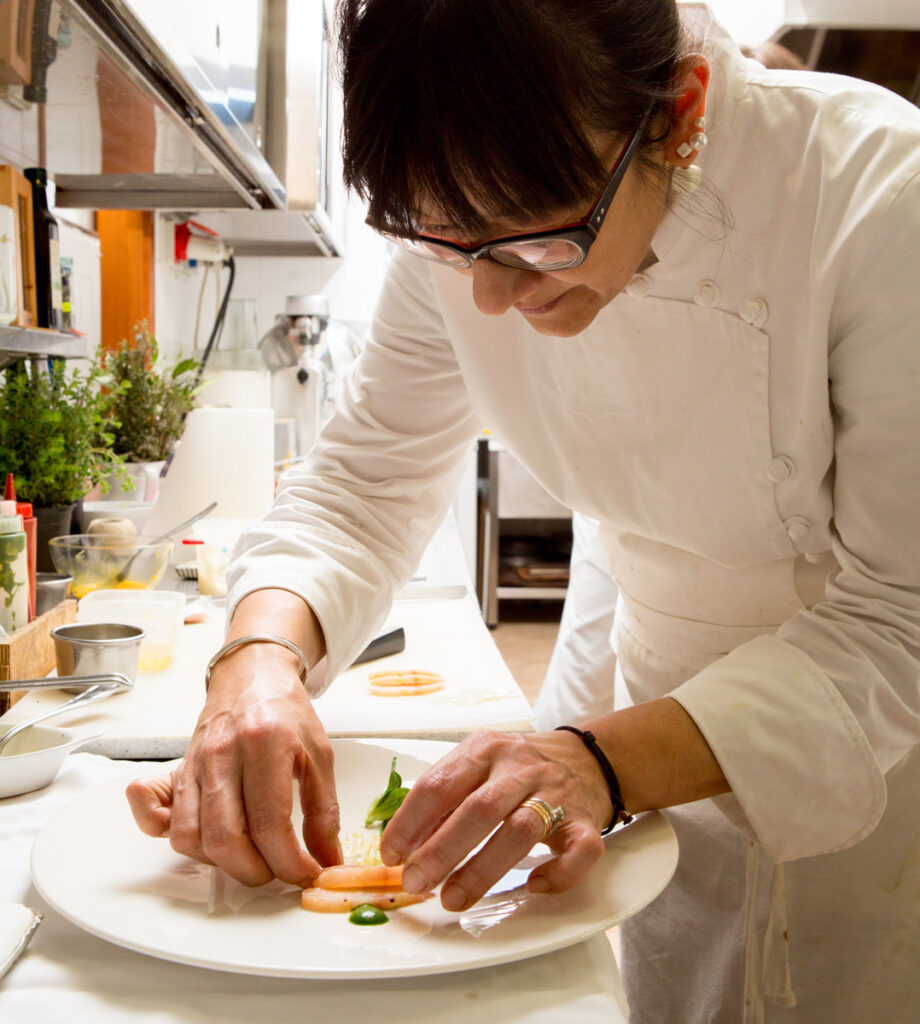
Salmon Pink Kitchen: And one for Monica, what is your favourite part of the job in the dining room?
Monica: It surely isn’t washing the glasses! Jokes aside, it’s the moment service begins because it’s like going on stage. This is our dining room and we are here to serve our guests, but at the same time you serving them is your performance, it’s your contact and dialogue with each guest, it’s amazing because it’s you. They come to our home and we are here to welcome them. So, for me, it’s really like being on stage. It’s a feeling I have always had, as if the curtain opened. When we built the porch outside, people driving from Borgonovo told us it felt like being at the cinema, with this screen of people hosting and being hosted. I have also always been very ambitious, so I particularly like curating my appearance for service, the make-up, the outfit, it’s my costume.
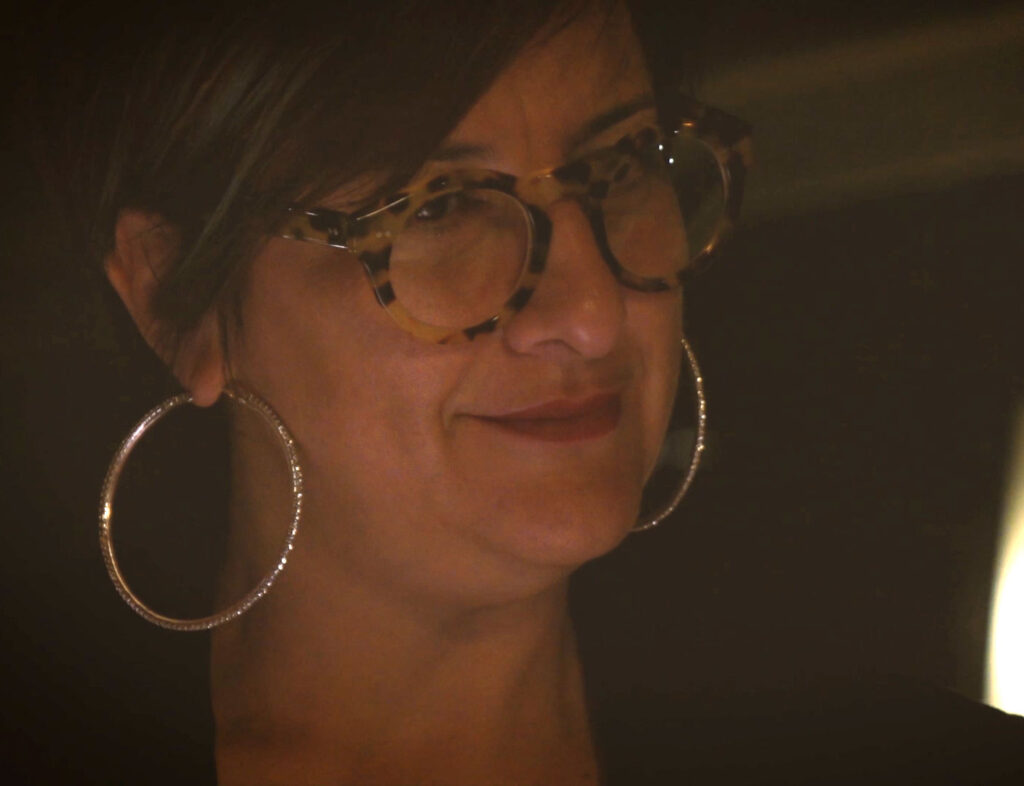
Salmon Pink Kitchen: Speaking of innovation and tradition, during lockdown you shared handwritten recipes from your mother’s archive and old cookbooks, it was a moment to revisit these culinary affections in a modern key. How do you work on traditional recipes to turn them into a dish by La Palta?
Isa: Monica and Roberto taste it, I study it, because the idea begins with the desire to use a recipe from the tradition, but then it requires different trials, experimentation, different pairings. Sometimes you turn them upside down. Maybe the main ingredient is the same, but the cooking technique or the shape of the dish are completely different. And, then, the final job is Monica’s and Roberto’s in which they taste and find the dish’s flaws, then we work on the balance. It’s a lot of fun to revisit these dishes because you always have one foundation, which is your history, or that of your territory. It’s great to go look for these and transform them. (Stefana, Isa’s and Monica’s mother walks in to sit at her usual place at the bar).
When you have a restaurant like this, where people from other towns and regions come to, I believe it’s important that they find something from here, it’s great if they sit at the table and recognise where they are from what is on the menu. Habitually, we have donkey or horse on the menu, but cooked and presented in different ways, because it’s the ingredient that takes you back to the tradition, and with that you know you are in Piacenza.
Salmon Pink Kitchen: How did you reconcile being sisters by blood and business partners?
Monica: Well, we never had to think of it as an issue: we lived together, we’re only two years apart, it’s as if we were twins, and we shared everything except for the years Isa was away to study. (looking at Isa) They were 5 long years without you. We’ve always been partners in life, in affection, in family.
Isa: We always got on really well. Obviously, we argue because perfection doesn’t exist, but at the end of the day we refocus and support the other’s objectives.
Monica: And then we had to work out the family part, making sure everyone who came after us got along. Because this is our home. (They call in Roberto). You know, people often tell Roberto he has married two women because getting on with two sisters like us is not easy!
Isa: Also, Monica always comes first for me. Because we have known each other for 50 years. It’s a strange feeling because the moment you have your own family certain things change.
Monica: And then there are the issues with the children: the ones who live with you, the ones who help you in the restaurant, the ones who don’t, the ones who have to go and the ones who have to come, everyone passes through here.
Isa: Basically, we’ve been doing smart-working for 25 years. Especially when they were just born (Monica and Isa’s youngests were born two months apart) and we were breastfeeding them. Imagine which state of mind we worked in! Guests began to arrive, you started service knowing your child had to eat around 8.30/9pm, while also knowing you had to give your best to cater for the customers. It wasn’t easy, but we made it, and now they’ve all grown.
Salmon Pink Kitchen: What’s the strangest dish you ever ate or cooked? Even something you disliked.
Isa: Some meatballs made of a green insect I don’t remember the name of that I ate in Egypt, in the desert. They were delicious.
Monica: Whereas for me it’s something I hated, a chamomile pain perdu. Something that still makes me sick at the thought of it! (Isa and Roberto agree)
Salmon Pink Kitchen: You’re packing up and moving to a desert island tomorrow, what’s your last supper?
Monica: Coppa, obviously, a huge bowl of anolini…
Isa: I’d like to eat bread or focaccia with salame, then surely a rare meat with vegetables, maybe donkey, or some game, these are my favourite things, I’m not interested in a primo. And then I’d eat my friend Paola’s apple pie. (Roberto points out that Isa always brings salame and Grana in her suitcase when they go on holiday).
Monica: No, for me it’s either anolini or lasagne. As dessert I’d like to have zabaione. It’s odd how I’m so not a dessert person, but the ones I like are the super sweet ones. And then pizza, how could I forget pizza? I’m fattening, what rare meat and vegetables, give me some calories because I’ll have to survive on this island!
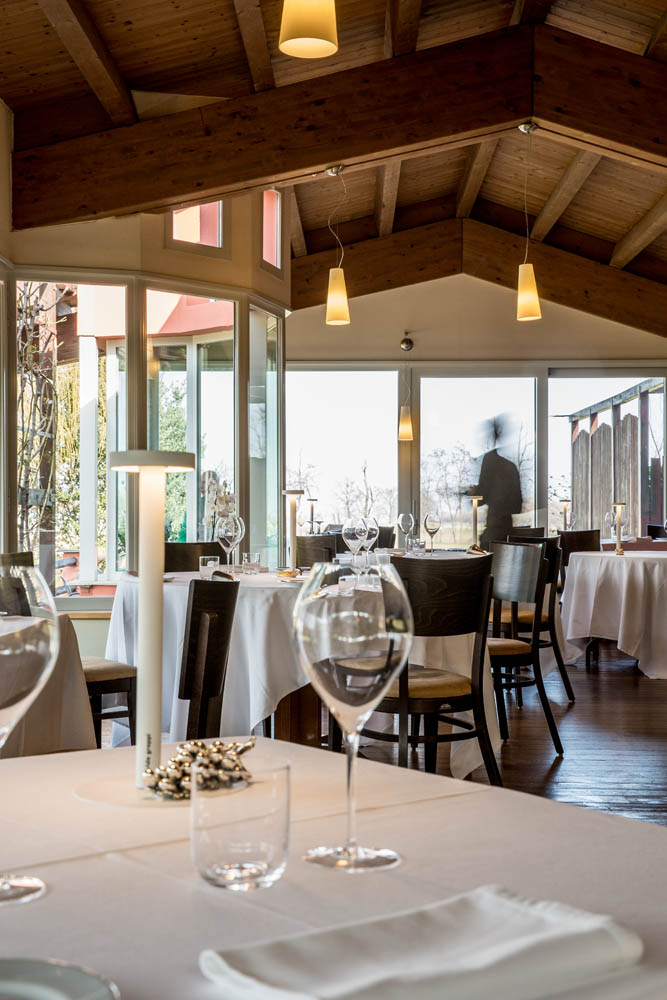
Thank you to Isa and Monica for welcoming us into their home, we can’t wait to return, next time with our legs under the table!
Irene & Margaux
